It’s an interesting fact that while small sedans have largely disappeared from the general market you can still find a number of them in the luxury car market.
Including subcompact models like Audi’s A3 sedan.
It’s a really small car – about the same size as a Hyundai Accent, which is pretty much the smallest sedan you can buy. This pint-sized Audi is nearly as economical to drive as the Accent, too – rating 28 MPG in city driving and 38 on the highway (the Accent carries an EPA rating of 33 city, 41 highway).
But the A3 isn’t an economy car. It’s an economical luxury car. And that may account for people wanting to buy it.
Which might explain why Audi continues to make it.
The A3 is Audi’s smallest sedan – and a much smaller sedan than non-luxury-brand compacts such as the Honda Civic sedan and the Toyota Corolla sedan, both of which are nearly a foot longer.
It’s only 176.4 inches long – just barely longer than a Hyundai Accent sedan. Which is the smallest four-door sedan you can still buy that isn’t a luxury brand sedan.
It comes in two trims, Premium ($35,995) and Premium Plus ($39,595). Both trims come standard with a turbocharged 2.0 liter engine paired with a mild-hybrid system that cycles the engine off as often as possible (hence the economy car gas mileage) and a seven speed automatic transmission.
Quattro all-wheel-drive is available optionally. 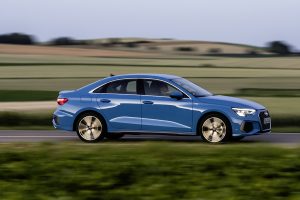
None of those items are available optionally – or at all – in subcompact economy cars like the Accent
The A3’s chief rival is the Mercedes A-Class sedan – which is even smaller. It also has a smaller sticker price ($33,950) to start.
But it has a trunk so small it’s almost gone – and not much more of a backseat area, either.
LED headlights are now standard in both trims and wireless charging has been added to the Convenience Package. Last year’s Prestige trim has been dropped.
What’s Good
Economy car mileage in a luxury car package.
Roomier back seat and larger trunk than rival small luxury cars offer.
Fits easily where it’s tight for larger cars.
What’s Not So Good
Generic exterior styling.
Some interior bits look . . . economical.
The upgrade (15 speaker, 680 watt) Bang & Olufsen 3D audio system requires buying the Premium Plus trim and then buying the $2,250 Technology Package, pushing this “entry level” Audi’s MSRP well over $40k.
Economy cars are economical because their engines aren’t powerful. The A3’s 2.0 liter engine (standard in both trims) is powerful and economical. It makes 201 horsepower and uses only a little more gas than the 120 horsepower engine that just barely powers the only slightly more economical Hyundai Accent.
But it’s more than just power that makes the difference.
This Audi uses very little gas because its engine is frequently not using any. The A3 features a mild hybrid system that automatically shuts down the engine when engine power isn’t needed, as when the car isn’t moving – or when it’s decelerating/coasting. A belt-driven starter is used to quickly get the engine running again whenever its power is needed – without the driver feeling (or hearing) it.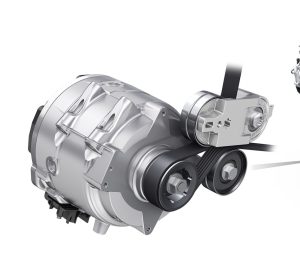
The system adds cost, of course – which is why the A3 costs more than something like an Accent. But it’s also why you have your cake and eat it, too – as far as very good gas mileage and power/performance.
Speaking of that.
The A3 gets to 60 in just over six seconds – as opposed to about nine seconds for a small economy car such as the Hyundai Accent.
A seven speed dual clutch automatic transmission is standard. Dual clutch automatics are designed to be more efficient than conventional automatics. The same guiding principle behind the continuously variable (CVT) automatic transmissions that are very commonly found in economy cars. But unlike CVT automatics – which don’t have gears and so don’t shift through them – dual clutch automatics do have gears and shift through them quickly. They are performance automatic transmissions that are also efficient transmissions.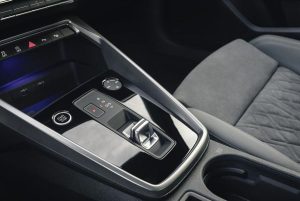
It’s among the differences between a luxury car like the A3 and an economy car like the Accent.
There’s a similar difference between the A3 and the luxury car that is probably its closest rival, the Mercedes A-Class sedan. The latter also has a turbocharged 2.0 liter engine but it’s a less powerful engine (188 horsepower) as well as a less economical one (25 city, 36 highway).
The reason for the latter being its engine is usually on.
The Mercedes A doesn’t have (or offer) a hybrid system to keep the engine off as often as possible, so it’s almost always burning gas. That’s why it burns more gas. It’s also why it makes less power – so as not to burn even more gas. If Mercedes kicked up the power to match the output of the A3’s hybrid combo – without the hybrid part of the combo – the Benz’s mileage would suffer accordingly.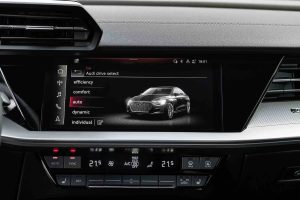
It’s harder to sell a very small car that uses about the same gas as a bigger car – with a bigger (and stronger) engine. Mercedes used to offer a diesel engine that did even better than a gas-hybrid combo such as the one in the A3 – but federal “emissions” regulations have regulated such engines off the market, notwithstanding the fact that by burning very little fuel, they “emit” very little in the way of gasses, too.
Speaking of gas . . .
The A3’s engine is a regular fuel engine. It does not require premium to deliver on its horsepower/performance or mileage claims.
The A3 is also the only new Audi that doesn’t come standard with Quattro all-wheel-drive, which not everyone necessarily wants (or wants to pay extra for). It is available, however, as optional equipment.
One of the main reasons to buy a small car is because it is a small car.
Small cars are easier cars to drive in traffic because they can exploit briefly open windows in traffic that are closed to larger cars. It is easier to maneuver around something blocking the way when you are driving something that can sneak around it; to fit into a tight curbside parking spot you’d otherwise have to pass by, if you were driving a larger car.
The main reason not to buy a small car is – usually – the small car ride. That “small car” feeling you get when everything around you, just about, is bigger. That latter is something Audi can’t do much about – without making the A3 bigger – and then it wouldn’t be an A3 anymore.
The former is something Audi did something about.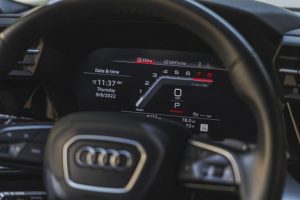
In part by adding gravitas – weight.
A small car like the Hyundai Accent feels like what it is because it doesn’t weigh much – just 2,670 lbs. The almost-the-same-size A3 weighs 3,329 lbs. (3,494 lbs. for the Quattro model) and those additional pounds translate into heft, the quality that makes even a smaller car feel like a larger car. Economy cars like the Accent have to be light – in order to be economical. A luxury car like the A3 can afford to be heavier, without sacrificing much in the way of economy.
That is what you’re paying for, after all.
Of course, weight isn’t the only difference. The A3 has a four-link rear suspension with aluminum rather than stamped steel pieces; the Accent has a simpler, torsion beam rear suspension. You’ll feel the difference every time the road dips. The A3 also feels more planted – because it has a bigger footprint. A two-inches-wider footprint. Seventeen vs. fifteen-inch wheels. You can also select varying levels of ride firmness and steering weight by choosing Dynamic vs. Comfort (which softens things up, when you select that).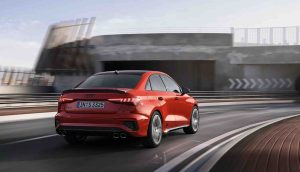
It makes a big difference.
So also what happens when you push down on the accelerator. The A3 accelerates. An economy car like the Accent eventually gets going. It doesn’t get going to 130 MPH, either – which is how fast the A3 can go, if you keep accelerating. Probably, it can go faster than that – its top speed being electronically limited to 130 MPH. The Accent’s top speed is just . . . limited.
And if more speed is wanted, Audi offers a hot-rod version of the A3 called the S3, which comes standard with a 306 horsepower version of the S3. Look out for the four exhaust tips, which is the tip-off.
This one, of course, doesn’t return economy car gas mileage. But it does get to 60 in less than 5 seconds.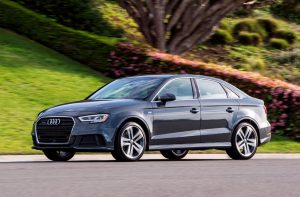
At The Curb
The exterior of the A3 is blandly attractive. It’s the inside that will turn your head. Or rather, the space inside – given how small this car is on the outside. Especially relative to other, similarly small luxury sedans such as the Mercedes A-Class.
You’d expect the back seats to be almost unusable. And they are . . . in the Mercedes, which offers a scanty 33.9 inches of rear seat legroom vs. a surprisingly generous 35.2 inches in the Audi. That is also, interestingly, several more inches of backseat legroom than you’d have in the back of the Hyundai Accent.
Which may account for why Hyundai has cancelled the Accent. Though economical, it is not a very practical car, being too small in the back (and trunk) for even a small family. The same goes for the Mercedes A Class sedan, which is more stylish on the outside – but so tight on the inside (and in the trunk, which offers just 8.6 cubic feet of space) that it might as well be a coupe.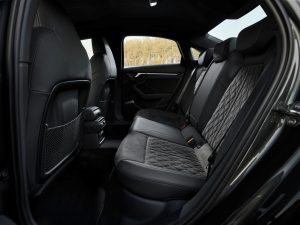
Along these lines, it is interesting to note that Acura nixed the ILX – which was about the same size as the A3 – in favor of the larger and roomier Integra (my review of that one is here). But it is a larger car – by almost a foot longer – and that makes it a compact-sized car rather than a subcompact-sized one.
Not that there’s anything wrong with that.
But the new Integra is a larger (longer) car – and maybe you don’t want the extra length to get the additional room.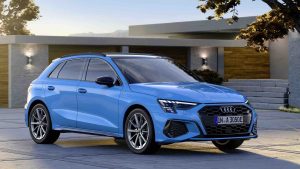
Audi could have made the A3 even roomier – as regards space for cargo. And did, actually. Just not here.
In Europe, you can buy a wagon version of the A3 – the Sportback – which Audi elects not to sell here. Audi will sell you an electric “eTron” Sportback – which is a hatchback. But its price tag is far from economical – and while it has more room, it doesn’t go nearly as far.
Only about half as far, in fact. But that’s a subject for another rant.
As Audi’s least-expensive car, the A3 is – nominally – an “entry-level” car. The designation has lost much of its former meaning, though, because current “entry level” luxury cars such as the A3 come standard with features and amenities you used to have to buy a much-more-expensive car to get. These include three-zone climate control, a configurable LCD instrument cluster (with another, larger LCD screen off to its right that displays Google Earth-style GPS map overlays), leather seats and a panorama sunroof.
Options include the ultra-premium 3D Bang & Olufsen audio system with 15 speakers – which is a lot of speakers for a small car – as well as a Heads-Up display and automated parking, if you need that.
The car also comes standard with four USB charge ports.
The Bottom Line
It’s economy-sized – and as economical to drive as an economy car. But the A3’s an economy car like Hulk Hogan is petite.
. . .
Got a question about cars, Libertarian politics – or anything else? Click on the “ask Eric” link and send ’em in! Or email me at EPeters952@yahoo.com if the @!** “ask Eric” button doesn’t work!
If you like what you’ve found here please consider supporting EPautos.
We depend on you to keep the wheels turning!
Our donate button is here.
If you prefer not to use PayPal, our mailing address is:
EPautos
721 Hummingbird Lane SE
Copper Hill, VA 24079
PS: Get an EPautos magnet or sticker or coaster in return for a $20 or more one-time donation or a $10 or more monthly recurring donation. (Please be sure to tell us you want a magnet or sticker or coaster – and also, provide an address, so we know where to mail the thing!)
My eBook about car buying (new and used) is also available for your favorite price – free! Click here. If that fails, email me at EPeters952@yahoo.com and I will send you a copy directly!


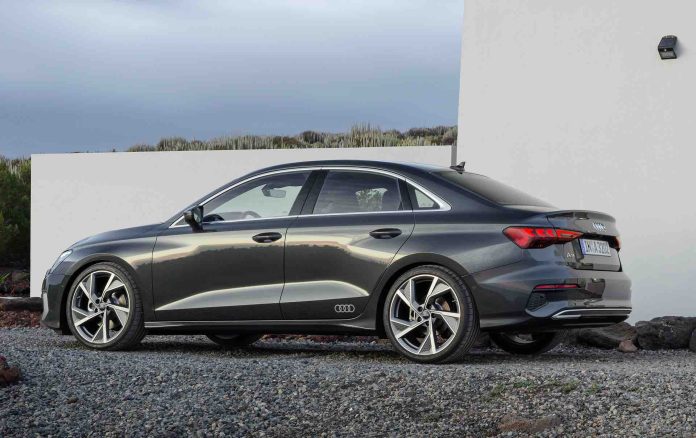

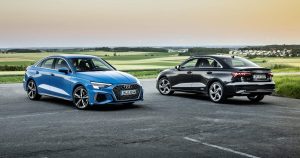
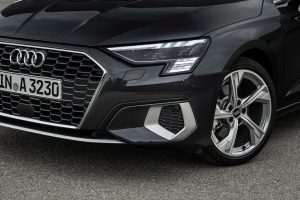
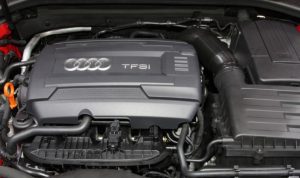
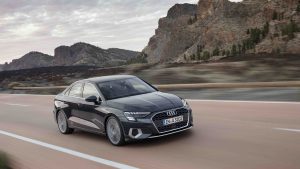
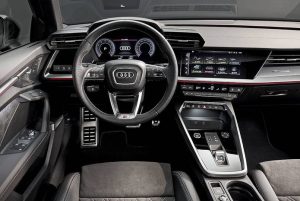


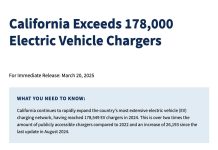

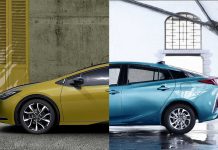


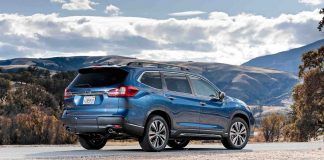
See if they’ll send you an RS-5 to review!
I have begged!
But looks like a Wagoneer is on deck. But that’s a lot better than another “crossover.” Someone pass the Scotch, please.
RS3 love….
This Audi RS3 is cheaper then a tesla plaid
This tuned Audi RS3 has more power 1100 hp, then a tesla plaid, which has 1020 hp.
This Audi RS3 is far lighter at 3000 lb, then a tesla plaid which weighs 4828 lb, that is why it is quicker.
This Audi RS3 is a lot quicker then a tesla plaid
This Audi RS3 has longer range 420 miles…… the tesla plaid has only 285 mile range on the highway where you need range or the car is useless.
This Audi RS3 refuels far quicker in 5 minutes………. compared to a tesla plaid recharging 0% to 100% in 15 hr at home, 1 hr and 20 minutes on the road, if there is a 1 hour lineup at the charger it takes 2 hr, 20 min to recharge…..lol
This Audi RS3 lasts longer 300,000 miles, the tesla plaid only lasts 100,000 miles or less, when the battery is dead and the car is then worthless because the battery is very, very expensive to replace, not worth it, just scrap it. Buying one Audi RS3 is cheaper then buying 3 tesla plaids….lol….when there is only EV’s only the rich will drive, that is racist, not inclusive…
This Audi RS3 has only one engine, it puts out more power then the 3 combined weak motors in the tesla plaid
The RS 3 you can actually hear and feel, it is alive, the sound of this thing is wild, EV’s are dead no emotion or fun……the tesla plaid is dead, no fun.
A brand new Audi RS 3 starts off at a base price of $56,200 in the USA, MSRP.
You can buy and tune an RS 3 for less then a tesla plaid and it is quicker, this RS 3 ran an 8.4 second quarter mile. 0 to 60 1.3 seconds. 3000 lb 1100 hp. ….it is quicker then ther hypercars…
This RS 3 is a better solution then buying a 4828 lb. tesla plaid. ice cars are better then EV’s.
https://www.hotcars.com/worlds-fastest-audi-rs3-drag-races-ken-blocks-1400-hp-mustang-hoonicorn/
the sound of this thing is insane, listen at 2:52 in video…
it beat the 2800 lb, 1400 hp 1965 Mustang hoonigan 2 out of 4 times….the RS3 is about 200 lb heavier and only has 1100 hp, 300 less then the Mustang…
Ive learnt somehow German horses are worth a lot more than most others when trying to set times. Not quite sure why – but somehow German cars with less horsepower are always faster than American/British others with more power….
the 2.5 litre 5 cyl turbo engine in this RS3 is one of the best, strongest engines in the world. it is running 60 lb of boost and is a daily driver, most engines at 60 lb of boost would break in 5 minutes….lol
and they want to scrap this great technology for electric washing machine motors….lol
I agree, Anon –
It is tragic. Like throwing away a perfectly good New York Strip steak in favor of a piece of rancid chicken.
If you swapped this tuned 2.5 litre 5 cyl turbo engine with the rest of the RS3 drivetrain into a tesla, the tesla might actually be fast, it would be quicker then it is with the 3 stupid washing machine electric motors….lol….but it is easier to just buy the tuned RS3, it is higher quality, looks better, it is cooler, it sounds way better, it is a lot quicker and will last three times as long as the tesla….
It doesn’t make any sense to me in producing a subcompact that is not a hatchback – best of both – small size with good passenger and cargo space. Americans seem to accept hatchbacks only when there is no choice as in Prius and Tesla.
My last hatchback, and still in the family, a 2004 Chevrolet Malibu Maxx with standard V6.
I agree, libertyx –
But for some strange reasons, hatches (and wagons) aren’t hot sellers in the U.S. luxury car market. They are, however, in Europe. Go figure!
Eric – Go figure!
It may hark back to the days of the Vega and Pinto – they were, shall we say, not stellar vehicles and were available as hatchbacks. Maybe the US folks came to think the same of all
hatchbacks.
I think you’re right libertyx. Hatches came to America as econoboxes and they’ll always be thought of as econoboxes.
I owned a First Generation S3 which was illegal in States but Fuck ‘Em, I had what I wanted – not what Fed Ass Wipes told me I could have. It was a good fast car which I drove for 12 years and then turned-in on an S1. Around 2014, I purchased an A3 which was still available without all the Nanny Trash cars have today. The problem was the Electronic Hand Brake. It was nearly impossible to drive the car onto Car Ramps and I never got the hang of pulling away from a stop on a hill. I either rode the clutch or stalled the car nearly every time despite the Hill Holder. I traded-in the A3 within a year. Not sure if an A3 with the largest motor and a Standard Transmission can be ordered any more but it doesn’t matter, I wouldn’t get a car with an Electric Hand Brake again anyway – or any of the other electronic junk new cars have – except for ABS.
Nice car. Good option over the M-B A series. Could do without the mild-hybrid and ASS for sure. Guessing the mpg differential would be marginal with the weight savings of all that crap. Another good small sedan option is the Caddy CT4 and the very good CT4-V.